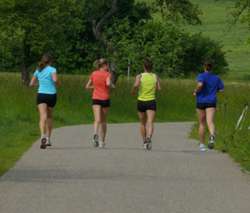Pounding the pavement: Traditional training methods are still safer, more effective

(PhysOrg.com) -- Race season is here again, and that means more first-timers on the marathon/triathlon circuit. Officials from some of the biggest marathons and triathlons in the country are reporting record numbers of participants, many of whom are first-time competitors.
In Philadelphia, for example, around 23,000 participated in the 10-mile Broad Street Run this year; ten years ago, there were about a third of that number.
The reason behind these increased numbers could be the growing number of resources available to first-time runners. An industry of books, websites, “e-coaching” programs and DVDs all aimed at the beginning runner has grown over the past several years, all with the promise of helping a rookie achieve his or her best time.
While it’s great that so many people are getting excited about getting active, Howard Palamarchuk, director of sports medicine at Temple’s podiatry school, says it’s not the best way to go.
After treating runners at some of the most grueling fitness events in the country, he calls what he’s seeing at the finish lines “a little scary.
“How many of those 23,000 [at the Broad Street Run] are truly runners or athletes that train on a regular basis,” he said. “Or is this event now a happening — the cool thing to do if even if you don't properly train for it?”
To prevent injury and make sure first-timers are truly ready, Palamarchuk says there’s no substitute for face-to-face training — such as joining a local running club or running with a more experienced partner — and careful medical screening.
“In the old days, runners had to have a doctor’s certificate to show they were in excellent health before they could even be considered as a participant,” he said.
Palamarchuk lauds events like the Susan G. Komen walk, because organizers provide careful medical screenings, excellent preparation and training standards and medical information months before the event.
In the end, he says, no book, or website, or high tech running gear (except for maybe a sturdy pair of shoes) will make a marathon or triathlon any easier for a rookie.
“Just proper training, careful planning, and careful attention to one's health, limitations and injuries,” he said. “That’s the correct way of race preparation.”
Provided by Temple University (news : web)















